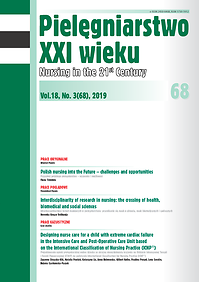Rationed nursing care – conclusions from focus groups
DOI:
https://doi.org/10.2478/pielxxiw-2019-0019Keywords:
focus group, nursing intervention, rationed care, nursing, general nurseAbstract
RATIONED NURSING CARE – CONCLUSIONS FROM FOCUS GROUPS
Aim. The focus groups aimed to outline the main areas of missed care and identify how the causes, effects and potential solution proposals are perceived.
Methods. For the initial part of the research, the focus group method was selected. Three focus groups were organized which comprised 25 nurses working in inpatient wards of healthcare facilities in the Moravian-Silesian Region.
Results. Based on the content analysis, four main categories were established: causes and consequences of missed care, missed interventions and suggestions for potential solutions. These were further divided into subcategories. The causes of missed care were related to the nurse’s personality, patient’s personality, healthcare system and management system. Missed interventions were classified into basic nursing care interventions, specialized interventions to be performed by nurses and common activities. The consequences of missed care affect both patients and the staff. The suggestions for potential solution included changes in management and marketing, education of healthcare professionals and patient care.
Conclusions. With respect to care rationing, the quality of care provided must not be compromised to a point where the safety of the staff and patients is at risk. Discussing these issues openly may result in search for other potential solutions that may be implemented in practice.
References
1. ČESKO. Zákon č. 372/2011 Sb. ze dne 6. listopadu 2011, o zdravotních službách a podmínkách jejich poskytování (zákon o zdravotních službách). In Sbírka zákonů České republiky. 2011, částka 131. s. 4730-4801. Available: https://aplikace.mvcr.cz/sbirka-zakonu/ViewFile.aspx?type=z&id=23497
2. Válková M. Hodnocení kvality poskytovaných zdravotních služeb. Praha: IPVZ, 2015.
3. Podstatová R, Chocholáč D. Ukazatele kvality ve zdravotnictví [online]. © 2019, [cit. 2019-24-09]. Available: http://www.stapro.cz/ukazatele-kvality-ve-zdravotnictvi/.
4. Kalisch JB, Landstrom G, Williams RA. Missed Nursing care: Errors of ommision. Nurs Outlook. 2009; 57(1): 3-9.
5. Kamberelis G, Dimitriadis G. Focus Groups. In Denzin, N. K., Lincoln, Y. S. Collecting and Interpreting Qualitative Materials. 3rd ed. Sage Publications, 2008. p. 375-402.
6. Stewart DW, Shamdasani PN. Focus groups: theory and practice. 3th ed. SAGE Publications, 2015.
7. Miovský M. Kvalitativní přístup a metody v psychologickém výzkumu. 1. vyd. Praha: Grada, 2006.
8. Krueger RA, Casey MA. Focus Groups: A Practical Guide for Applied Research. 5th ed. SAGE Publications, 2014.
9. Morgan DL. Ohniskové skupiny jako metoda kvalitativního výzkumu. 1. vyd. Boskovice: Nakladatelství Albert, 2001.
10. Švaříček R, Šeďová K. a kol. Kvalitativní výzkum v pedagogických vědách. 2. vyd. Praha: Portál, 2014.
11. Hendl J. Kvalitativní výzkum: základní metody a aplikace. Praha: Portál, 2016.
12. ČESKO. Ministerstvo zdravotnictví. Vyhláška č. 391/2017 Sb. ze dne 16. listopadu 2017, kterou se mění vyhláška 55/2011 Sb. o činnostech zdravotnických pracovníků a jiných odborných pracovníků, ve znění vyhlášky 2/2016 Sb. In Sbírka zákonů České republiky. 2017, částka 137. s. 4360-4375. Available: https://aplikace.mvcr.cz/sbirkazakonu/ViewFile.aspx?type=z&id=62503
13. Winsett RP, Rottet K, Schmitt A, et al. Medical Surgical Nurses describe missed nursing care tasks – Evaluating our work environment. App Nurs Res. 2016; 32: 128-133.
14. Cho E, Lee NJ, Kim EY, et al. Nurse staffing level and overtime associated with patient safety, quality of care, and care left undone in hospitals: A cross-sectional study. Int J Nurs Stud. 2016; 60: 263-271.
15. Henderson J, Willis E, Blackman I, et al. Causes of missed nursing care: qualitative responses to a survay of Australian nurses. Labour & Industry: a journal od the soucial and economic relations of work. 2016; 26(4): 281-297.
16. Kalisch BJ, Tschannen D, Lee H, et al. Hospital variation in missed nursing care. Am J Med Qual. 2011; 26(4): 291-299.
17. Hernández-Cruz R, Moreno-Monsiváis MG, Cheverría-Rivera S, et al. Factors influencing the missed nursing care in patients from a private hospital. Rev LatAm Enfermagem. 2017; 25: 2877-2885.
18. Kalisch BJ. Missed Nursing Care A Qualitative Study. J Nurs Care Qual. 2006; 21(4): 306-313.
19. Ball JE, Bruyneel L, Aiken LH, et al. Post-operative mortality, missed care and nurse staffing in nine countries: A cross-sectional study. Int J Nurs Stud. 2018; 78: 10-15.
20. Kalisch JB. Errors of omission: how missed nursing care imperils patients. Silver Spring: American Nurses Association, 2016.
21. Laňková J, Raboch J. Deprese. Doporučený postup pro všeobecné praktické lékaře. Praha: Společnost všeobecného lékařství ČLS JEP, 2013.
22. Kalisch JB, Xie B, Dabney B. W. Patient-reported missed nursing care correlated with adverse events. Am J Med Qual. 2014; 29(5): 415-422.
23. Jones TL, Hamilton P, Murry N. Unfinished nursing care, missed care, and implicitly rationed care: State of the science review. Int J Nurs Stud. 2015; 52(1): 1121-1137.
24. Vanfosson CA, Jones TL, Yoder KH. Unfinished nursing care: An important performance measure for nursing care systems. Nurs Outlook. 2016; 64(2): 124-136.
25. Blackman I, Henderson J, Willis E, et al. Factors influencing why nursing care is missed. J Clin Nurs. 2015; 24(1-2): 47-56.
26. West E, Baron DN, Harrison D, et al. Nurse staffing, medical staffing and mortality in Intensive Care: An observational study. Int J Nurs Stud. 2014; 51 (5): 781-794.
27. Papastavrou E, Andreou P. Exploring sensitive nursing issues through focus group approaches. Health Sciences Journal. 2012; 6(2): 185-200.
28. Bartůňková M, Jarkovský J, Dušek L. Personální kapacity v českém zdravotnictví [online]. © 1995 - 2019, poslední aktualizace 24. 9. 2019 [cit. 2019-24-09]. Available https://www.uzis.cz/system/files/nzis_rep_2018_E01_Personalni_kapacity_2017.pdf
29. Svoboda M. Nejzávažnějším problémem českého zdravotnictví je nedostatek kvalifikovaných zdravotníků v nemocnicích [online]. © 1995 – 2019 ASO, [cit. 2019-24-09]. Available: https://www.asocr.cz/obsah/54/nejvaznejsim-problememceskeho-zdravotnictvi-je-nedostatek-k/21975.
Published
Issue
Section
License
Copyright (c) 2019 Authors

This work is licensed under a Creative Commons Attribution-NonCommercial-NoDerivatives 3.0 Unported License.




